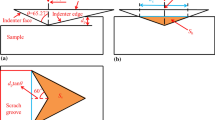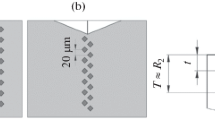Abstract
During scratching of lead glass at elevated temperatures the scratch hardness, the types of crack that appear and the length of the cracks have been investigated. It was found that the hardness decreases with increasing temperature. The hardness increases with rising scratching speed, but the increase disappears gradually with rising temperature. It was also found that some types of crack disappear with increasing temperature, whereas other types of crack became more pronounced. Also a new type of a long lateral crack was found at elevated temperatures. The length of some types of crack showed an unexpected dependence on load. The average length of the cracks first increased with temperature but decreased sharply above a certain temperature. An attempt is made to explain the observed effects in the hardness with the aid of a deformation model proposed for metallic glass while using existing knowledge on the structure of the glass investigated and the known interaction of the glass surface with water. The crack phenomena are explained in terms of the the known enhanced slow crack growth at elevated temperatures, the relaxation taking place in the glass surface and the occurrence of viscous flow at the crack tip at an even higher temperature.
Similar content being viewed by others
References
A. Broese Van Groenou andJ. D. B. Veldkamp,Philips Tech. Rev. 38 (1978/79) 69.
R. Brehm, K. Van Dun, J. C. G. Teunissen andJ. Haisma,Prec. Eng. 1 (1979) 207.
K. L. Johnson,J. Mech. Phys. Sol. 18 (1970) 115.
R. W. K. Honeycombe, “The Plastic Deformation of Metals”, (Arnold, London, 1974).
J. D. B. Veldkamp, N. Hattu andV. A. C. Snijders, in “Fracture Mechanics of Ceramics 3”, edited by R. C. Bradt, D. P. H. Hasselman and F. F. Lange, (Plenum, New York, 1978).
D. M. Busch, Films E1328-E1330, Inst. Wiss. Film. Göttingen, 1967.
B. R. Lawn andE. R. Fuller,J. Mater. Sci. 10 (1975) 2016.
V. I. Primenko, A. N. Shiryaeva andV. I. Galyant,Glass Ceram. 35 (1978) 666.
J. H. Westbrook andP. J. Jorgenson,Trans. Met. Soc. AIME 233 (1965) 425.
J. F. Kranich andH. Scholze,Glastechn. Ber. 49 (1976) 135.
T. N. Loladze, G. V. Bokuchava andG. E. Davidova, in “The Science of Hardness Testing and its Applications”, edited by J. H. Westbrook and H. Conrad (American Society for Metals, Metals Park, Ohio, 1973).
M. Yamane andJ. C. Mackenzie,J. Non-Cryst. Sol. 15 (1974) 153.
J. M. Stevels, in “Handbuch der physik XIII”, edited by S. Flügge (Springer, Berlin, 1962).
M. Imaoka andI. Yasui,J. Non-Cryst. Sol. 22 (1976) 315.
E. M. Rabinovich,J. Mater. Sci. 11 (1976) 925.
C. A. Pampillo,ibid. 10 (1975) 1194.
J. C. M. Li, in “Frontiers in Materials Science”, edited by L. E. Murr and C. Stein (Marcel Dekker, New York, 1976).
R. J. Charles, in “Fracture Mechanics of Ceramics 4”, edited by R. C. Bradt, Dph Hassehnan and F. F. Lange (Plenum, New York, 1978).
Author information
Authors and Affiliations
Rights and permissions
About this article
Cite this article
Veldkamp, J.D.B., Hattu, N. Deformation and cracking during high-temperature scratching of a glass. J Mater Sci 16, 1273–1284 (1981). https://doi.org/10.1007/BF01033842
Received:
Accepted:
Issue Date:
DOI: https://doi.org/10.1007/BF01033842




